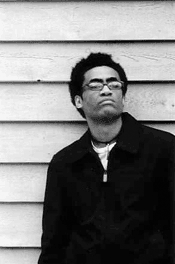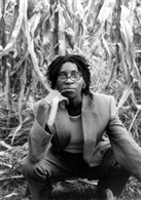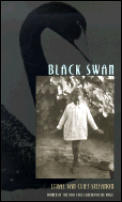Author2Author: Lyrae Van Clief-Stefanon & Thomas Sayers Ellis
As National Poetry Month winds down, Author2Author welcomes two outstanding African-American poets in conversation with each other how their verse has developed. Thomas Sayers Ellis‘s most recent collection, The Maverick Room, was published by Graywolf earlier this year (read an excerpt). Lyrae Van Clief-Stefanon’s first collection of poems, Black Swan, won the Cave Canem prize for new African-American poetry when it was published in 2001 (read Bop: Haunting“).
 Thomas Sayers Ellis: What are you working on now? How far have you moved away from Black Swan and myth, and how far from mixing the way we talk with the way mythologies are fixed? Do you really like Myth or were you simply unhappy with its cultural positioning as “king of meaning” and “king of container”? Myth has always behaved like a Gangsta to me, and a bad big brother to, or white owner of, folklore. Lord knows I’m waiting for ‘lore to poison Massa with-the-quickness and leave Quikskill’s mouth-running (see Ishmael Reed‘s Flight to Canada) note on his chest. Certain mythologies, then, seem bad owners to me. Users, full of pimpin’, and out-dated show-offs.
Thomas Sayers Ellis: What are you working on now? How far have you moved away from Black Swan and myth, and how far from mixing the way we talk with the way mythologies are fixed? Do you really like Myth or were you simply unhappy with its cultural positioning as “king of meaning” and “king of container”? Myth has always behaved like a Gangsta to me, and a bad big brother to, or white owner of, folklore. Lord knows I’m waiting for ‘lore to poison Massa with-the-quickness and leave Quikskill’s mouth-running (see Ishmael Reed‘s Flight to Canada) note on his chest. Certain mythologies, then, seem bad owners to me. Users, full of pimpin’, and out-dated show-offs.

Lyrae Van Clief-Stefanon: I’m working on a manuscript called Open Interval. It is a meditation on identity using the universe as lens. It is preoccupied with stars, particularly RR Lyrae stars. Myth’s still there, in some ways, and for the very reasons you mentioned. If myth is king of meaning, king of container, one way to subvert that shit is to bogart it, create a mythologized, black, woman, literary self as constellation.
I think RR Lyrae stars are useful for that. In astronomy they are “standard candles,” objects with a known luminosity, measuring distance. You can use them to tell the ages of galaxies. I think they work particularly well semiotically. They open up some fascinating possibilities. I’m into the RR as crossroads, as blues sign; I’m into the “are, are” sound, particularly posited against the “I am” of identity. So, the book’s definitely in conversation with Black Swan.
I’m interested in whether the sections of The Maverick Room that parallel the districts of Washington, D.C., mirror them in any way, tonally, or the ways the poems cut through, if at all, like the streets there. D.C.’s one of the few places I’ve been where I can get lost walking! And that having made no turns. The streets turn into other streets. You find yourself elsewhere without ever meaning to be, which is fascinating. How much playing with that did you do?
Thomas Sayers Ellis: I agree about the surprises walking through D.C. can present, with the local interrupting the federal and vice versa, so that was there (as I love walking through Washington). Remember Benjamin Banneker peeped the frustrated Frenchman’s plans for the city and added his own twist and turns–those circles and wide avenues like escape routes. I think that the poems in The Maverick Room are filled with escape routes not just surprises. You see, I’m a tradition hound. The sections of the book attempt to invent a new map and truth, a repaired literary one: new places to live and other literacies: emotional, social and visual. I want D.C. to change. I want the percussion to continue but I am not sure that politics is the best or first bridge to do so. A line is a walk, a line break is a break then a turn and nowadays we turn before the line breaks. We verse and reverse. I hope you got lost, eye-lost, in The Maverick Room.
I would love to see a new stanza, here and now, from one of the poems in Open Interval, perhaps an example of your “bogarting,” a term I love. Will you share one with us and talk about how “bogarting” works there. (This kind of technique is discussed at length, with examples, in Zora Neale Hurston’s Characteristics of Negro Expression. I’ve got Madd Love for verbal nouns.)

Lyrae Van Clief-Stefanon: Bogarting is a term I heard and used as a kid that’s shifted and reshaped itself for me as I got older. (To go Humphrey, apparently the term comes from Bogart’s tendency to have a cigarette hanging from his mouth as he spoke, a cig from which he’d rarely to never actually take a drag.) The first way I remember it is in terms of talking with a group–“He be bogarting the conversation”–which meant shoving one’s way in and taking over. It’s got connotations of stealing, and being sly about it–“she bogarted my seat”–and hogging–“look at you, bogarting all the cookies.” It’s used (as a drug reference, particularly) to talk about someone holding on to something that’s supposed to be passed along or shared. For me, in terms of identity, it came to mean making a place for one’s self, regardless of invitation or reception, insisting on one’s self.
In some ways, the academy is the biggest Bogart going, particularly in terms of poetry. I feel, especially as a kid who grew up marking and remarking upon bogarting–and that’s my authority, I authorize myself from out of my own experience—I feel I can come in and snatch it (poetry). Say “that’s mine!” Say “gimme that” but/and then, just take it. Transform the academy’s bogarting theory and practice (mythology is not for you, black girl, sit down and be quiet, we’ll tell you who you are and when/where/if you can speak, here’s the language you are allowed, the rest is reserved for us, here’s your culture, here are your allusions, etc.) into my own bogarting theory and practice. To borrow from June Jordan’s “Poem about my Rights”:
“I am not wrong: Wrong is not my name/ My name is my own my own my own/ and I can’t tell you who in the hell set things up like this/ but I can tell you that from now on my resistance/ my simple and daily and nightly self-determination/ may very well cost you your life”
As for a stanza from Open Interval, I have a bop in there called “Bop: The North Star.” (And I have to say I’m a terrible bogarter of the bop form, because I think it’s perfect for doing just this work.) Anyway, the poem refers to my experiences teaching poetry this semester at Auburn, a maximum security men’s prison located in the town where Harriet Tubman eventually settled and had a house. In it, I take myself to task for, among other things, being “part of” the academy, and for not knowing the stars, a skill that could have saved my life in Harriet’s time. And I bogart a line from Edward Snow’s translation of Rilke’s First Duino Elegy as the refrain. Here’s the last stanza:
At the prison at Auburn I cross the yard. Inmates whet tongues against
my body, cement sculpted, poised for hate—pitch compliments
like coins-—wade)—their silver, slickening—(in the water)—
uncollected change. The guard asks Think they’re beautiful?
just wait ‘til they’re out here stabbing each other.
Oh, Harriet, the stars throw down shanks:
teach the sonnet’s a cell, now try to escape.
Yes, the springtime needed you. Many a star was waiting
for your eyes only.I’ve always been interested in re-serving lines of (reserved) poetry, in giving lines back in the context of my mouth, my having spoken them. That’s what bogarting’s about for me. I’m a nut about epigraphs. Everything’s in conversation with something else. (Black Swan was in a lot of ways a meditation on another line from the first Duino Elegy: “Beauty is nothing but the beginning of terror.”) Like you, I’m interested in escape routes and new literacies, places to live within the poem.
Now, I have to ask for the same: lines/stanzas from what you’re working on now, a new map you’ve made for us to traverse and explore.
Thomas Sayers Ellis: This air, the contemporary one, seems to be filled with so many things that it’s hard to keep up with ones’ self, with ones’ own breathing, especially with ones’ own thinking and feeling about breathing; and isn’t this the first duty of a line poetry? However, in most cases, only sighs or glimpses are catchable, how awful, and still I am full of work and load. Reading, then, and living, has loaded me, again. Confession: I was once a drum and now I feel a gun, a proud one, full of the different levels of blackness–how many, I don’t know, but certainly more than I’ve ever felt before. I absorb this from everyone and I feel it all over, the way one feels his or her own private briar patch.
In my work this means that my channels, my frequencies, those used to load and unload nuances of Coloredness, Negroness, Blackness, and then some, are all simultaneously living and alive, a mixed congregation, all bothering and worrying me with non-traditional ways around and of replacing the usual poetic devices. See “Marcus Garvey Vitamins” for “psyche”, the supreme trick-move, and for why I, sometimes, think subject-verb disagreement is legit. I feel this swelling in our everything, them changing same-old-same-olds, the real reasons why Blackness ain’t one thing and why we (Black folks) don’t all get along (in art or life) in February or April.
Call it a Supafly2k triple crossroads but whatever it is I am feeling very “Return to…” and very full of us. I even made the Celie-Color-Purple-Fingers (between poems) at an audience the other day. All in all, I’m repairing something. I must be…the I in we, perhaps. Here’s an excerpt/offering from “The Return of COLORED ONLY”—
Naturally, this will scare
the civil rights out of some
and, for a mad-moment, empower
a great many wrong-cultured others.
To this “The Return…”
will either code switch or hood ornament,
drama-drumming both—a cult-nats matrimony
of the vernacular re-mix: ain’t studin’ you,
nommo no more nommo,
stop studin’ us.
27 April 2005 | author2author |

 Our Endless and Proper Work is my new book with Belt Publishing about starting (and sticking to) a productive writing practice.
Our Endless and Proper Work is my new book with Belt Publishing about starting (and sticking to) a productive writing practice. 
